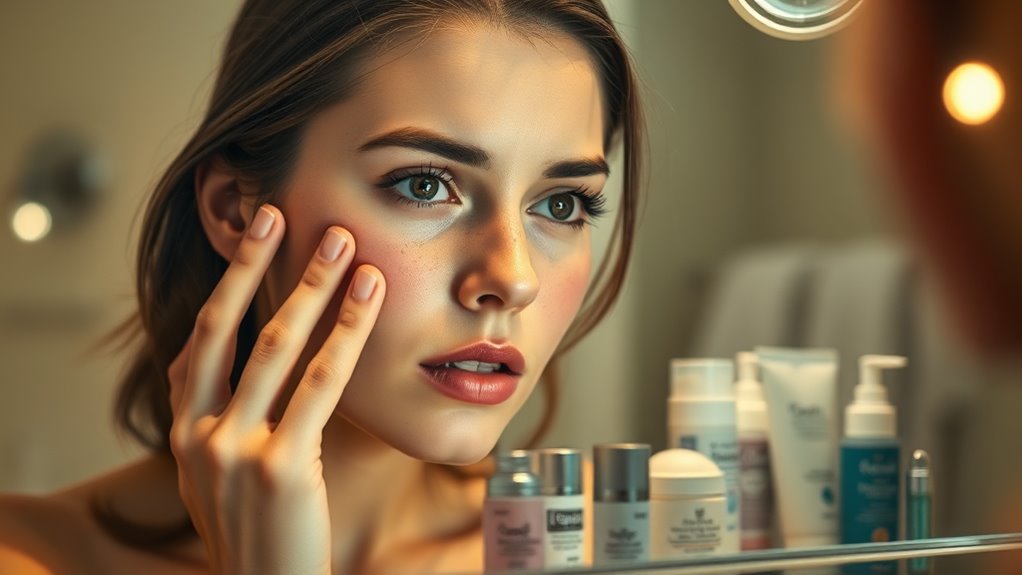The Dark Spot Mistake Most People Don’t Know They’re Making
Many people overlook the multifaceted causes of dark spots, believing they’re just tied to aging. Hormonal changes and sun exposure are significant factors that contribute to their formation. Additionally, overusing exfoliants can damage the skin’s barrier, while neglecting hydration leaves skin vulnerable. Skipping professional advice also hinders effective treatment. Understanding these aspects is vital to prevent and address dark spots effectively. Keep following along to uncover more insights on maintaining radiant skin.
Common Misconceptions About Dark Spots
Although many people associate dark spots solely with aging, this common misconception overlooks several factors that contribute to their formation.
Factors like hormonal changes, sun exposure, and even certain medications play a significant role.
You might be making a dark spot skincare mistake by neglecting these influences, assuming they’re only a sign of aging.
Understanding this helps you address the issue more effectively.
The Importance of Consistent Sun Protection
Since sun exposure is one of the primary culprits behind the development of dark spots, consistent sun protection is essential for maintaining an even skin tone. Applying broad-spectrum sunscreen daily can help shield your skin from harmful UV rays. Proper sunscreen application techniques are crucial to ensure you receive the full benefits of your chosen SPF.
| Type of Sunscreen | SPF Level | Application Frequency |
|---|---|---|
| Chemical | 30+ | Every 2 hours |
| Physical | 30+ | Every 2 hours |
| Tinted | 30+ | Every 2 hours |
Overusing Exfoliants: A Double-Edged Sword
When you overuse exfoliants, you risk damaging your skin barrier, which can ironically lead to the very dark spots you’re trying to avoid.
Frequent exfoliation can strip essential oils, causing inflammation and sensitivity. This disruption allows for uneven skin tone and hyperpigmentation.
Ideally, you should exfoliate 1-3 times a week, depending on your skin type, to maintain a healthy, balanced complexion. Over-exfoliation can result in compromised skin health, making it imperative to listen to your skin’s needs.
Ignoring the Role of Hydration
Hydration plays a crucial role in maintaining healthy skin and preventing dark spots.
When your skin lacks moisture, it becomes more vulnerable to environmental damage and pigmentation changes.
Proper hydration boosts skin elasticity, enhances barrier function, and aids in cellular repair processes.
Drinking enough water and using hydrating skincare products can significantly reduce the appearance of dark spots and promote overall skin health. Additionally, water consumption has been shown to directly improve skin texture and resilience against aging.
The Misstep of Skipping Professional Advice
Maintaining hydrated skin can’t replace the value of seeking professional advice for dark spot treatment.
Dermatologists use advanced diagnostic tools to assess pigmentation issues, recommend tailored treatments, and monitor progress effectively.
Over-the-counter solutions may not address underlying causes, potentially worsening the condition.
Trusting professionals ensures you receive evidence-based approaches, maximizing your chances for achieving clearer, healthier skin while minimizing risks. Additionally, incorporating active ingredients that combat acne can further enhance your treatment plan and results.
Patience Is Key: Managing Expectations
Understanding that improvement takes time is crucial for effectively managing dark spot treatments.
You shouldn’t expect immediate results, as the skin’s repair process can take several weeks.
Consistent application of treatments, combined with sun protection, enhances effectiveness.
Monitor gradual progress instead of seeking quick fixes, and consult with a dermatologist for personalized guidance.
Patience allows your skin to respond optimally to therapies. Incorporating scientifically-proven anti-aging practices into your routine can further support your efforts.

